Sometimes, people suffer from poverty year after year not because of a lack of resources but because of a faulty worldview that prevents those resources from being used to their full potential.
For example, a family in a malaria-prone area may have enough bed nets on hand, and the family members may know that bed nets help prevent malaria, but the nets may go unused until something motivates the people to use them. For one person in this study, that motivation came from learning more about God’s plan for his creation:

“God wants us to be healthy,” he said. “And so if we have knowledge that mosquitoes spread malaria and yet do not use nets, it would be disobedience.”
Upon first examination, in this person’s community, 72 percent of community members had bed nets and used them. After gaining a deeper understanding of God’s desire for people to be healthy and for parents to responsibly protect their children, after two years that number had increased to 94 percent.
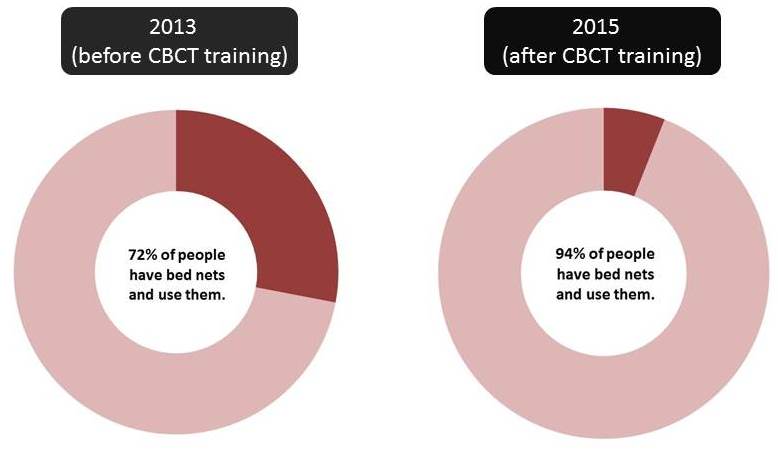
This is only one example of how poor communities across four regions of Uganda saw tangible improvements after local churches were trained on a biblical worldview and a wholistic approach to community development.
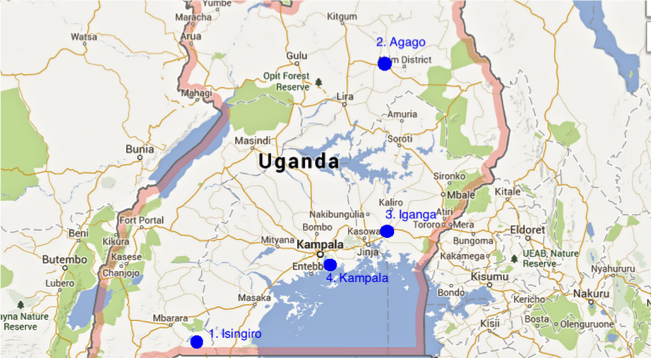
The initial training spanned two years and was carried out by Transforming Nations Alliance (TNA). It was called the Uganda Church-Based Community Transformation Project and was developed by the TNA based on a modified version of Reconciled World’s (RW) Truth-Centered Transformation materials. Both TNA and RW are DNA affiliate organizations.
Snapshot of results
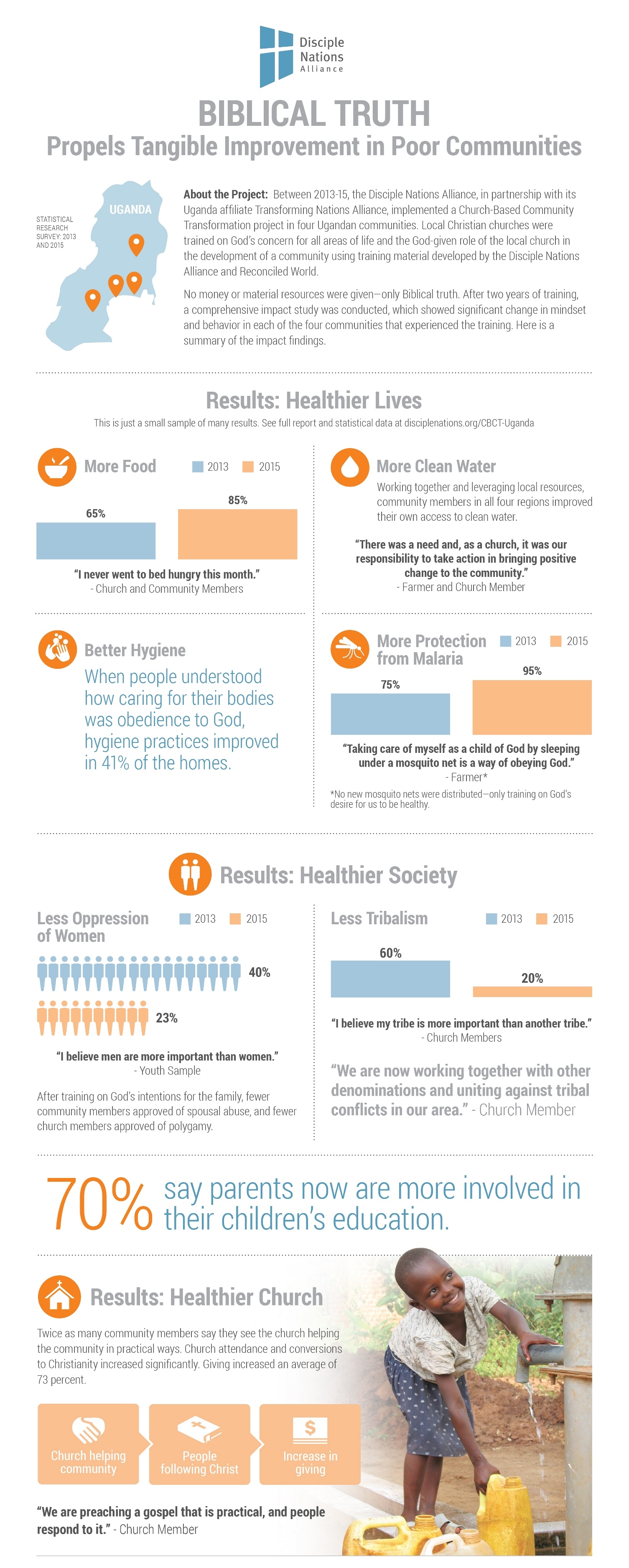
Background on the project
The Disciple Nations Alliance and its members champion a local-church, truth-centered approach to community development. Our basic belief is that the most important ingredients for community transformation are local Christians, empowered by the Holy Spirit and equipped with a biblical worldview, living out the truth and demonstrating Christ’s love while confronting cultural lies and distortions that are at the root of poverty and brokenness.
This approach puts the emphasis on local churches, local resources, and the power of biblical truth for cultural transformation. The staff of Transforming Nations Alliance (TNA) had seen Reconciled World develop an effective model in Southeast Asia for applying these components in the local church. TNA developed a modified version for application in Uganda. The DNA helped the TNA by identifying funding and by providing reporting and evaluation support for the first two-years. An objective evaluation of the project began in 2013 with a baseline measure of development in the communities, then a midterm measure two years later.

About the evaluation
The evaluation consisted of a baseline study in 2013 involving 336 persons and a midterm study in 2015 involving 290 persons. The responder groups included adult community members, youth, church members and church leaders across the four Ugandan regions. Differences between the baseline and midterm data were tested using chi-square tests for statistical significance at p<0.05.
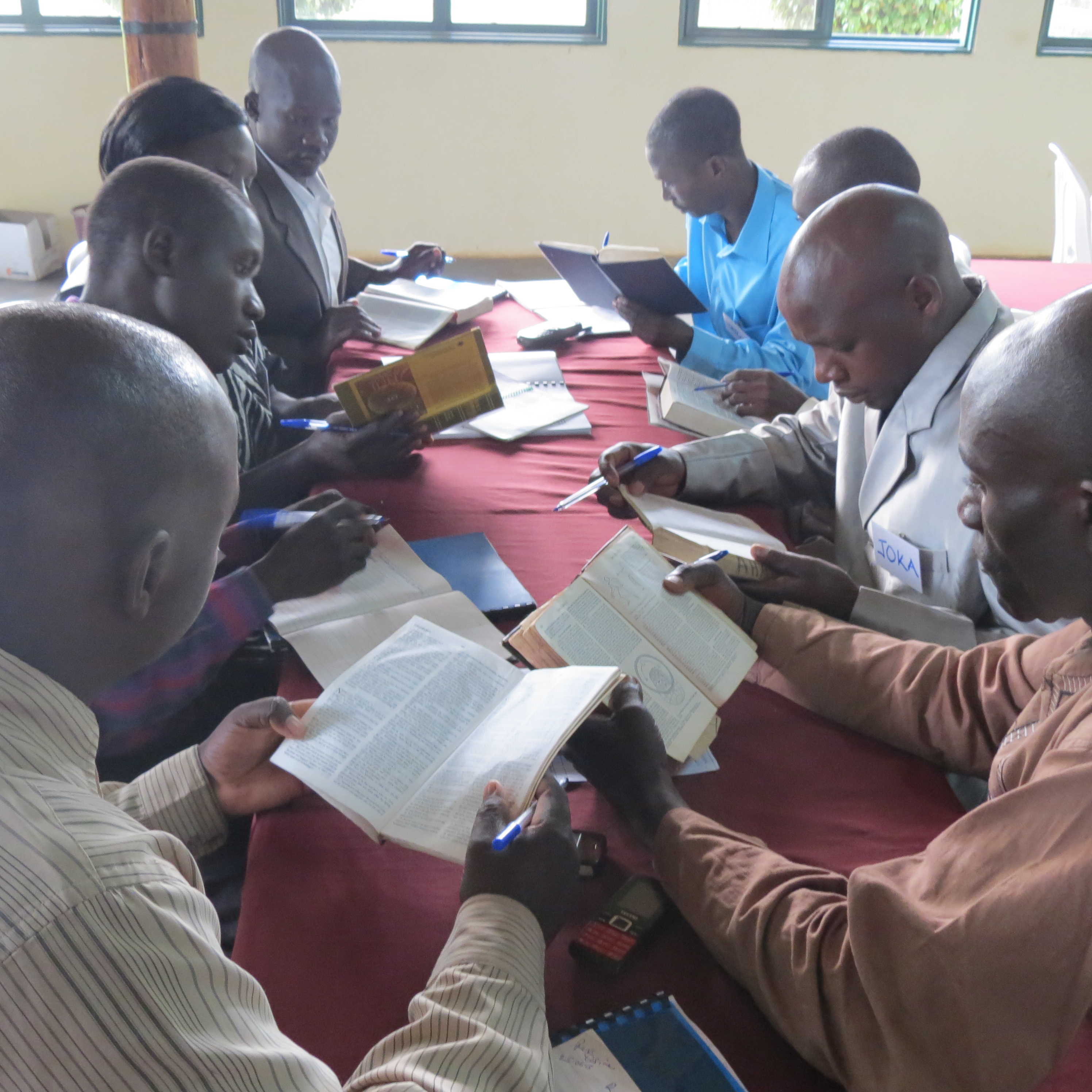
The evaluation measured to see if development progress had occurred in the communities with regard to food supply, education, malaria prevention, access to clean water, sanitation and hygiene, and community leadership. The evaluation then looked to see if there was a connection between this progress and the training that was done in the local church.
Even at this early stage of the program, the results clearly showed both development progress in the community and a connection to the training that was done in the local church.
Tangible improvements
Fewer people now go to bed hungry.
The percentage of people saying they never go to bed hungry increased to 85% from 65%.
Children are better fed.
The percentage of parents providing breakfast to their school-aged children increased from 66% to 87%. When asked where they learned about the importance of children eating breakfast, 24% of the community pointed to the church members. In turn, the church members credited the CBCT training.
I learned it from other people who have attended the CBCT trainings. – Housewife
I learned it from CBCT/church trainings. – Farmer
Churches are doing more to help the most vulnerable.
Two years into the program, twice as many community members said they see the church helping child-headed households with school fees, clothing and food. When church members were asked why they were more involved in this way, they said:
Because of good church leaders and CBCT trainings on the word of God towards giving and helping the needy. – Member of Mother’s Union in Isingiro
The CBCT team has taught people about the need to do practical evangelism and help people of all kinds despite/regardless of their denomination. – Isingiro community member
We are now more united as the body of Christ and thus we can reach out more and better to the needy. The teaching on working together by CBCT and others has caused this change. – Church elder in Agago
From the CBCT training, people were taught more about practical love. They were motivated to even start up a savings group to help the needy. The church also gives scholarships to students. – Mechanic in Kampala
The quality of education for children has improved.
59% of the respondents indicated improvement in the children’s education. 70% said parents are now more involved and shared examples:
I pay school fees for an orphaned child.
I contribute towards the salary of some teachers.
I attend all school meetings and plan for the school; and pay school fees on time.
When asked about the reasons behind the improvement, they said:
Some parents used to spend money on alcohol but, due to good preachers and training like CBCT, parents now invest their money wisely, especially in education.
The CBCT programs, through the churches and people they train, have motivated me.
More people have better access to clean water.
The percentage of persons having to walk 10 minutes or fewer to get clean water increased from 35% to 42%. When asked for the reasons behind the increase, they said:
Motivated by the (CBCT) training, we saved some money and built water tanks [at] my house. – Housewife (before, she would walk two hours to get water)
There was a need and, as a church, it was our responsibility to take action in bringing positive change to the community. – Farmer
The church mobilized to (reduce) water scarcity in the community. -Youth
Community members now work together, and we were able to collect money to construct a borehole. – Student
There was need to work together by providing labor to have the borehole constructed. Our motivation was the heart of togetherness and love for the community. – Builder from Rapha Deliverance Church
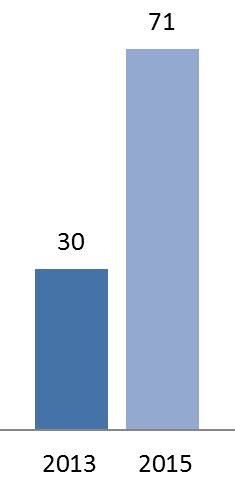
Healthy sanitation and hygiene practices improved
The percentage of homes in the community having a pit latrine, plate stand, a special container for clean water and a rubbish pit increased from 30% to 71%. Even something as simple but important as hand washing increased.
Positive changes in attitudes toward work, women, and tribalism
Work: The results also showed a significant shift in worldview and attitudes. For example, youth changed their view of the dignity of manual work with only 26% thinking that some manual labor was below a man’s dignity, down from 75% thinking this way.
Women: Again, among youth there was a decrease from 40% to 23% saying they believed men are more important than women.
Tribalism: Church members dropped from 60% to 20% in their belief that their tribe is more important than another tribe.
Church members said they thought differently about these things due to the teachings of the CBCT program.
More churches are working together
 Importantly, the community now sees the churches working together to serve the community.
Importantly, the community now sees the churches working together to serve the community.
One thing I am thankful for is that there is togetherness now as churches come together to do community work, which used not to happen. – Church leader in Agago
Increased church attendance and involvement
Though this was not a goal of the project, attendance and church involvement has increased, with the larger churches reporting attendance having increased by well over 100 people. Offerings have increased by an average of 73%.
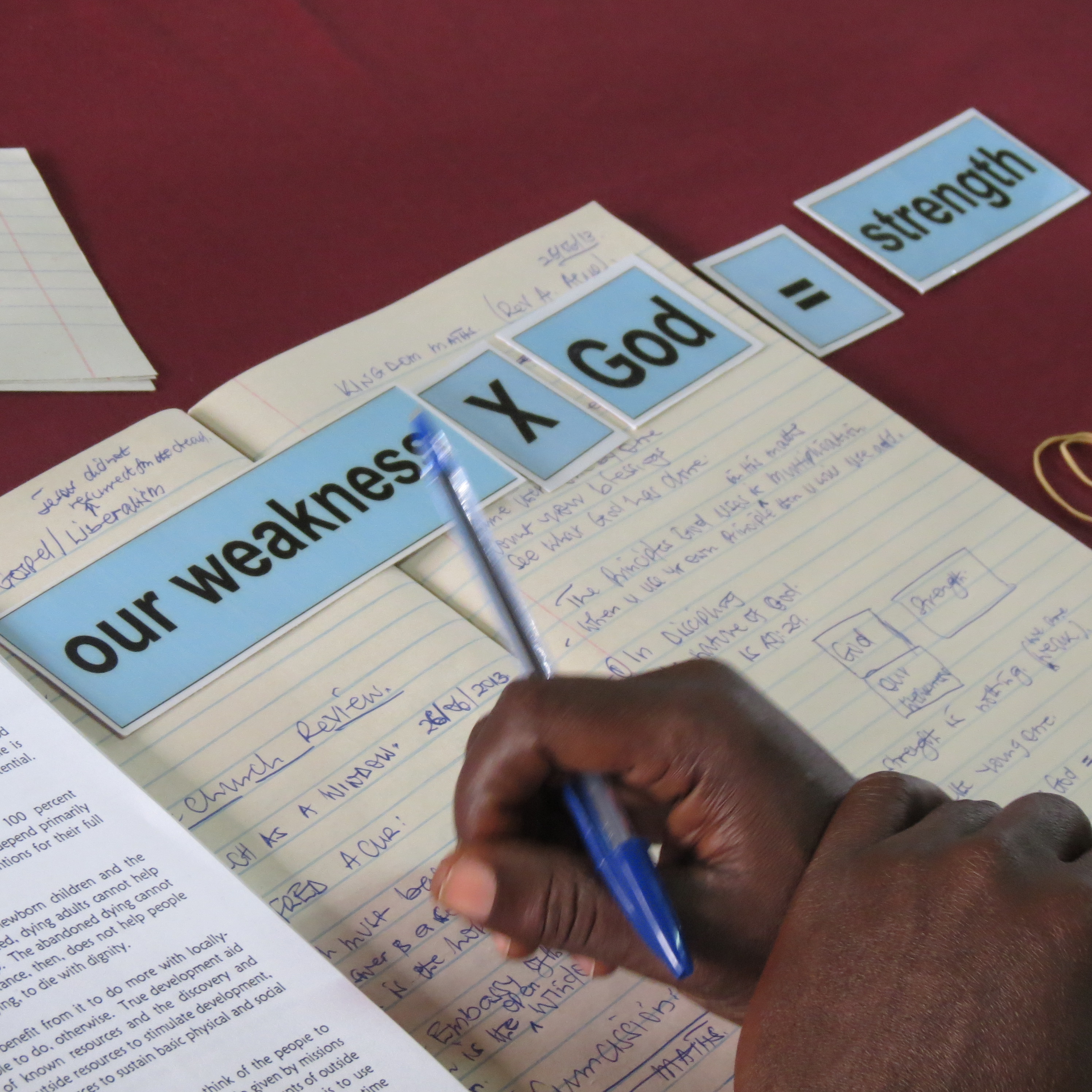
In summary, the evaluation results showed that development progress had occurred and that community members attributed the church with playing a key role. The church, in turn, attributed its increased involvement and change to the CBCT training on worldview and the role of the church.
The results support the idea that the most important ingredients for community transformation are local Christians, empowered by the Holy Spirit and equipped with a biblical worldview, living out the truth and demonstrating Christ’s love while confronting cultural lies and distortions that are at the root of poverty and brokenness.
Read more: Extended Summary Full Report
[1] Truth-Centered Transformation is a program of Reconciled World. The curriculum consists of 10 training modules taught over a five-year period delivered by local trainers/facilitators. The first three modules focus on biblical worldview and the role of the church. These three modules were delivered during the period covered by this evaluation.




One Response
Muy bueno lo del cambio de mentalida al pueblo de Dios